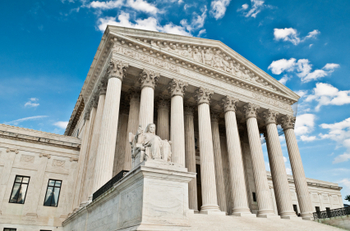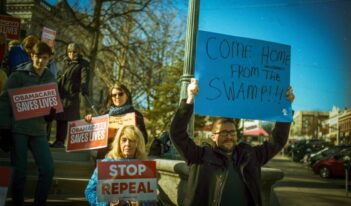
We excerpt key portions of Chief Justice Roberts’s opinion.
Last Thursday, the U.S. Supreme Court issued its much anticipated ruling on the constitutionality of the Patient Protection and Affordable Care Act (ACA), finding the controversial individual mandate to be authorized by Congress’s power to tax and spend. Over the last year, The Regulatory Review has featured numerous posts on the legal issues surrounding the ACA. With the Court’s decision last week, the constitutional debate over health care reform comes to a close, although the political contestation will undoubtedly continue.
We excerpt below some key portions of Chief Justice Roberts’s opinion handed down last Thursday (omitting citations and footnotes). In Roberts’s opinion, the ACA’s individual mandate did exceed Congress’s power under the Commerce Clause, a conclusion shared by a majority of members of the Court. However, Roberts also wrote the opinion adopted by another majority of the Court that upheld the health care law as an authorized exercise of Congress’s power of taxation. We excerpt parts of both portions of his opinion.
Commerce Clause Authority
The Constitution grants Congress the power to “regulate Commerce.” The power to regulate commerce presupposes the existence of commercial activity to be regulated. If the power to “regulate” something included the power to create it, many of the provisions in the Constitution would be superfluous. For example, the Constitution gives Congress the power to “coin Money,” in addition to the power to “regulate the Value thereof.” And it gives Congress the power to “raise and support Armies” and to “provide and maintain a Navy,” in addition to the power to “make Rules for the Government and Regulation of the land and naval Forces.” If the power to regulate the armed forces or the value of money included the power to bring the subject of the regulation into existence, the specific grant of such powers would have been unnecessary. The language of the Constitution reflects the natural understanding that the power to regulate assumes there is already something to be regulated.
Our precedent also reflects this understanding. As expansive as our cases construing the scope of the commerce power have been, they all have one thing in common: They uniformly describe the power as reaching “activity.” ….
The individual mandate, however, does not regulate existing commercial activity. It instead compels individuals to become active in commerce by purchasing a product, on the ground that their failure to do so affects interstate commerce. Construing the Commerce Clause to permit Congress to regulate individuals precisely because they are doing nothing would open a new and potentially vast domain to congressional authority. Every day individuals do not do an infinite number of things. In some cases they decide not to do something; in others they simply fail to do it. Allowing Congress to justify federal regulation by pointing to the effect of inaction on commerce would bring countless decisions an individual could potentially make within the scope of federal regulation, and—under the Government’s theory—empower Congress to make those decisions for him.
* * *
People, for reasons of their own, often fail to do things that would be good for them or good for society. Those failures—joined with the similar failures of others—can readily have a substantial effect on interstate commerce. Under the Government’s logic, that authorizes Congress to use its commerce power to compel citizens to act as the Government would have them act.
That is not the country the Framers of our Constitution envisioned. James Madison explained that the Commerce Clause was “an addition which few oppose and from which no apprehensions are entertained.” While Congress’s authority under the Commerce Clause has of course expanded with the growth of the national economy, our cases have “always recognized that the power to regulate commerce, though broad indeed, has limits.” The Government’s theory would erode those limits, permitting Congress to reach beyond the natural extent of its authority, “everywhere extending the sphere of its activity and drawing all power into its impetuous vortex.” Congress already enjoys vast power to regulate much of what we do. Accepting the Government’s theory would give Congress the same license to regulate what we do not do, fundamentally changing the relation between the citizen and the Federal Government.
* * *
Tax and Spend Authority
The exaction the Affordable Care Act imposes on those without health insurance looks like a tax in many respects. The “[s]hared responsibility payment,” as the statute entitles it, is paid into the Treasury by “taxpayer[s]” when they file their tax returns. It does not apply to individuals who do not pay federal income taxes because their household income is less than the filing threshold in the Internal Revenue Code. For taxpayers who do owe the payment, its amount is determined by such familiar factors as taxable income, number of dependents, and joint filing status. The requirement to pay is found in the Internal Revenue Code and enforced by the IRS, which—as we previously explained—must assess and collect it “in the same manner as taxes.” This process yields the essential feature of any tax: it produces at least some revenue for the Government. Indeed, the payment is expected to raise about $4 billion per year by 2017.
* * *
[T]he shared responsibility payment may for constitutional purposes be considered a tax, not a penalty: First, for most Americans the amount due will be far less than the price of insurance, and, by statute, it can never be more. It may often be a reasonable financial decision to make the payment rather than purchase insurance, unlike the “prohibitory” financial punishment in Drexel Furniture. Second, the individual mandate contains no scienter requirement. Third, the payment is collected solely by the IRS through the normal means of taxation—except that the Service is not allowed to use those means most suggestive of a punitive sanction, such as criminal prosecution. The reasons the Court in Drexel Furniture held that what was called a “tax” there was a penalty support the conclusion that what is called a “penalty” here may be viewed as a tax.
None of this is to say that the payment is not intended to affect individual conduct. Although the payment will raise considerable revenue, it is plainly designed to expand health insurance coverage. But taxes that seek to influence conduct are nothing new. Some of our earliest federal taxes sought to deter the purchase of imported manufactured goods in order to foster the growth of domestic industry. Today, federal and state taxes can compose more than half the retail price of cigarettes.



